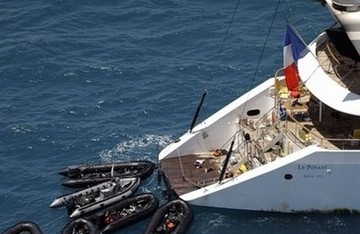
Photo: Piracy is a very lucrative business off Somalia’s coast,
and most kidnappers are said to treat their hostages well,
in anticipation of a well paid ransom.
The Cornell Daily Sun
October 3, 2008 – 12:00am
By Therese Lahlouh
Overview
Tensions are escalating in the Gulf of Aden off the Somali coast, where 20 Somali pirates have hijacked a Ukrainian vessel loaded with 33 Soviet-era tanks, rocket launchers and ammunitions on its way to Kenya. The pirates have demanded a $20 million ransom for the safe return of the cargo and 20 crewmembers. Somalia has authorized foreign powers to free the ship by any means necessary; currently six U.S. warships are monitoring the situation, and the European Union is staging an attack with help from over 10 countries, including Britain, Germany and Russia.
Origin
These piracy acts are not a new occurrence; over 26 ships have been hijacked in the last year, with ransoms totaling nearly $30 million according to the Associated Press.
“The root of the problem is the political crisis in Somalia. This failed state is harmful to the stability of the free movement of shipments throughout the region,” said Prof. Ayele Bekerie, Africana studies.
Somalia is widely considered to be a failed state. It has had no stable central government since the fall of the Somali Revolutionary Socialist Party in 1991, and many speculate that this instability is the main cause of the escalating piracy situation.
“I think the problem you have there is a failed state and the implications of a failed state for other states and world security. Somalia has collapsed, and there is no effective government. The lawlessness is now affecting the world in, among other things, the piracy you see,” said Prof. Muna Ndulo, law, and director of the Institute for African Development.
According to Bekerie, after the collapse of the government, Somalia was divided into three sections, with autonomous clans and sub-clans that “engage in their own economic interests.”
“Some were engaged in piracy, particularly those in the central region of Puntland. These forces started to realize that they could make millions of dollars by hijacking the boats that come through the Gulf of Aden,” Bekerie said. “They operate as groups, but they cannot be traced back to a government, state or any recognizable legal entity, so it is difficult to find them or hold them accountable.” Read more.

























